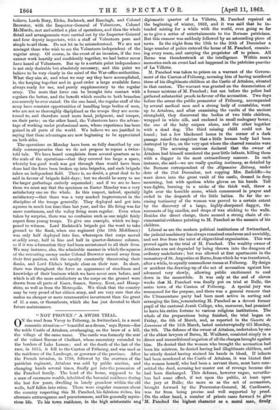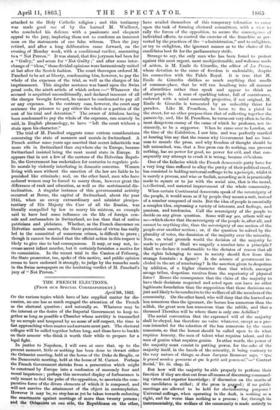"NOT PROVEN :" A SWISS TRIAL.
the road from Vevey to Fribourg, in Switzerland, in a most k.1 romantic situation—" beautiful as a dream," says Byron—lies the noble Castle of Attalens, overhanging, on the brow of a hill, the village of the same name. The castle was formerly the seat of the valiant Barons of Challant, whose suzerainty extended to the borders of Lake Leman ; and at the death of the last of the race, in 1615, it fell to the Canton of Fribourg, and was used as the residence of the Landvogt, or governor of the province. After the French invasion, in 1798, followed by the overturn of the patrician regiment, Attalens was sold by public auction, and changing hands several times, finally got into the possession of the Panchod family. The head of the house, supposed to be S man of enormous wealth, inhabited the baronial residence during the last few years, dwelling in lonely grandeur within the old walls, half fallen into ruins. There were singular rumours about the country respecting this M. Panchod, his fabulous riches, his alternate extravagance and penuriousness, and his generally myste- rious life. To his town residence, in the high aristocratic and
diplomatic quarter of La Villette, M. Panchod repaired at the beginning of winter, 1862, and it was said that he in- tended mixing for a while with the world, even going so far as to give a series of entertainments to the Bernese patricians. But this rumour was suddenly followed by an astounding piece of news. In the night from the 19th to the 20th of December a large number of police entered the house of M. Panchod, examin- ing every room, and carrying the proprietor off to prison. All Berne was thunderstruck at the intelligence. Within men's memories such an event had not happened in the patrician quartier of La Villette.
M. Panchod was taken to prison on a warrant of the Govern- ment of the Canton of Fribourg, accusing him of having murdered three of his illegitimate children at the Castle of Attalens, situated in that canton. The warrant was granted on the denunciation of a former mistress of M. Panchod ; but not before the police had gathered substantial proofs in favour of the accusation. Two days before the arrest the public prosecutor of Fribourg, accompanied by several medical men and a strong body of constables, went up to Attalens, and after examining the vaults of the ancient stronghold, they discovered the bodies of two little children, wrapped in white silk, and enclosed in small mahogany boxes ; the one of the baby corpses alone, and the other together with a dead dog. The third missing child could not be found ; but a few blackened bones in the corner of a dark passage raised the suspicion that a little human body had been destroyed by fire, on the very spot where the charred remains were lying. The accusing mistress declared that the owner of Attalens had himself murdered the poor little infanta, killing them with a dagger in the most extraordinary manner. In each instance, she said—we are really quoting testimony, as detailed by the Bernese correspondent of the illigemeine Zeitung, under date of the 21st December, not copying Mrs. Radcliffe—he went down into the great vault of the castle, dressed in deep mourning, but with spotless white gloves on his hands. Tall wax-lights, burning in a niche of the thick wall, threw a light over the horrible scene, which commenced in prayer and ended in the despatch of the little babies. So far the ac- cusing testimony of the woman was proved to a certain extent by the discovery of a large, highly-sharpened dagger, the remnants of big candles, and drops of wax sticking to the walls. Besides the direct charge, there seemed a strong chain of cir- cumstantial evidence pointing to M. Panchod as the assassin of his children.
Liberal as are the modern political institutions of Switzerland, the judicial machinery has always remained cumbrous and unwieldy, and not free from the taint of oligarchical organization. This was proved again in the trial of M. Panchod. The wealthy owner of Attalens was not degraded by being thrown into the dungeon of ordinary malefactors ; but was allowed at first apartments in the monastery of St. Augustine at Berne, fromwhich he was transferred, after a while, to equally commodious rooms at Fribourg. By design or accident the drawing-up of the act of accusation against him advanced very slowly, allowing public excitement to cool down in the meanwhile. It was only at the end of eleven weeks that M. Panchod was finally put on trial at Bulk, the assize town , of the Canton of Fribourg. A special jury was summoned for the purpose, and there was a general rumour that the Ultramontane party had been most active in sorting and arranging the lists,:remembering M. Panchod as a devout former pupil of the cantonal Jesuit College, who, moreover, had promised to leave his entire fortune to various religious institutions. The whole of the preparations being finished, the trial began on Friday, the 6th of March, and, as reported in the Gazette de Lausanne of the 13th March, lasted uninterruptedly till Monday, the 9th. The defence of the owner of Attalens, undertaken by one of the ablest lawyers of Berne, M. Wuilleret, consisted simply in a direct and unconditional negation of all the charges brought against him. He denied that the woman who brought the accusation had been his mistress, he denied having had illegitimate children, and he utterly denied having stained his bands in blood., If infanta had been murdered at the Castle of Attalens, it was hinted that the woman herself, who had been a servant there, must have com- mitted the deed, accusing her master out of revenge because she had been discharged. This defence, however vague, neverthe- less had some effect, if not upon the public, at least upon the jury at Bulle; the more so as the act of accusation, brought forward by the Procurator-General, N. Cardinaux, was far from being precise and well supported by proof. On the other hand, a number of priests came forward to give N. Panchod the highest character as a moral man, firmly
attached to the Holy Catholic religion ; and this testimony was made good use of by the learned M. 1Vuilleret, who concluded his defence with a passionate and eloquent appeal to the jury, imploring them not to condemn an innocent man on the statements of one false witness. Then the jury retired, and after a long deliberation came forward, on the evening of Monday week, with a conditional verdict, amounting to a" Not Proven." It was stated, that five jurymen had been for a "Guilty," and seven for "Not Guilty ;" and after some inter- change of "ideas," these divided opinions were harmoniously united at last after the Scotch fashion. The court thereupon ordered M. Panchod to be set at liberty, condemning him, however, to pay the whole of the expenses of the trial, as well as the charges of his imprisonment. This singular sentence was based upon the Swiss penal code, the ninth article of which orders :—" Whenever the accused is acquitted unconditionally, and declared innocent of all the charges brought forward, he cannot be condemned to pay all or any expenses. In the contrary case, however, the court may sentence the prisoner to pay either the whole or a portion of the cost of his trial and detention." The owner of Attalens having been condemned to pay the whole of the expenses, can scarcely be said, in English phraseology, to have "left the court without a stain upon his character."
The trial of M. Panchod suggests some curious considerations concerning the state of manners and morals in Switzerland. A French author some years ago asserted that secret infanticide was more rife in Switzerland than anywhere else in Europe, because Switzerland insisted being the most moral state in Europe. It appears that in not a few of the cantons of the Helvetian Repub- lic, the Government has undertaken for centuries to regulate pub- lic morals by violently interfering in domestic concerns. Women living with men without the sanction of the law are liable to be punished like criminals ; and, on the other hand, men who have seduced women may be forced to marry them, however great the difference of rank and education, as well as the matrimonial dis- inclination. A singular instance of this governmental activity occurred at Berne, the capital of Switzerland, about the year 1845, when an envoy extraordinary and minister plenipo- tentiary of His Majesty the Czar of all the Russias, was literally compelled by law to marry his mistress, an example said to have had some influence on the life of foreign con- suls and ambassadors in Switzerland, no less than that of native patricians and plebeians. Whether, as the French discourser on Helvetian morals asserts, the State protection of virtue has really led to the committal of numerous crimes, is difficult to prove ; though it cannot be denied that the official action in this respect is likely to give rise to bad consequences. It may, or may not, in- crease secret infant murder, but it certainly furnishes a motive for its commission. In the recent trial in the Canton of Fribourg, the State prosecutor, too, spoke of this motive, and public opinion seems to have endorsed it strongly, to judge by the remarks made in the Swiss newspapers on the hesitating verdict of M. Panchod's jury of "Not Proven."































 Previous page
Previous page